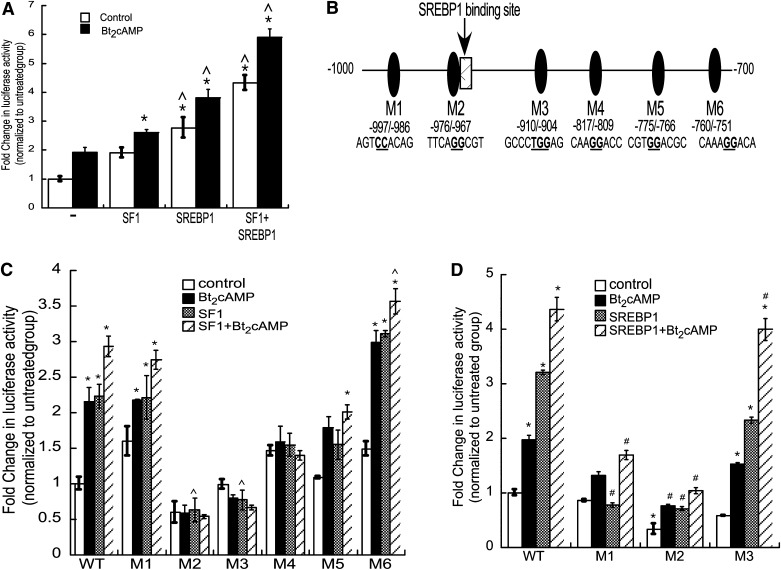Fig. 3.
SF1 and SREBP1 confer cAMP-stimulated increased DGKθ reporter gene activity. A: H295R cells were transiently transfected with pGL3-DGKθ, pCMV6-GFP-SF-1, pCDNA3.1-SREBP1c, and pRL-CMV and then treated 24 h later with Bt2cAMP (0.4 mM) for 24 h. Luciferase activity in lysates isolated from control (−) and Bt2cAMP-treated cells (+) was quantified by luminometry. Data are expressed as the fold change in pGL3-DGKθ (Firefly luciferase) reporter gene activity over the untreated control group mean, are normalized to pRL-CMV (Renilla luciferase) activity and represent the mean ± SEM of three separate experiments, each performed in triplicate. Asterisks (*) and carats (^) indicate a statistically significant difference (P < 0.05) from the pGL3-DGKθ control and Bt2cAMP-treated group, respectively. B: Depiction of −1,000 to −700 bp of the DGKθ promoter. Putative SF1/SREBP binding sites are denoted by ovals and labeled M1 to M6. C: H295R cells were transiently transfected with wild-type or mutant (M1 to M6) pGL3-DGKθ, pCMV6-GFP-SF-1, and pRL-CMV and luciferase activity quantified by luminometry. Data are expressed as the fold change in pGL3-DGKθ reporter gene activity over the untreated control group mean and represent the mean ± SEM of three separate experiments, each performed in triplicate. Asterisks (*) and carats (^) indicate a statistically significant difference (P < 0.05) from the untreated control group and untreated SF1-transfected group, respectively. D: Luciferase activity was quantified in lysates that were isolated from H295R cells that were transfected with wild-type or mutant (M1, M2, and M3) pGL3-DGKθ, pRL-CMV, and pcDNA3.1-SREBP1c expression plasmids. Changes in DGKθ promoter activity are normalized to Renilla luciferase activity and graphed as fold change over wild-type untreated control group. Asterisks (*) and hash (#) indicate a statistically significant difference (P < 0.05) from the untreated control group and the untreated SREBP1c-transfected group, respectively.

